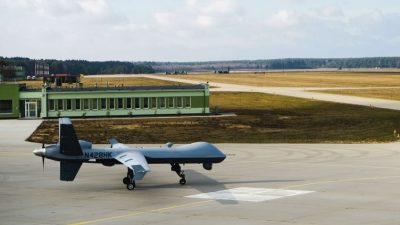EU Security Crisis: France About to Boost Military Interventionism in Eastern Europe

All Global Research articles can be read in 51 languages by activating the Translate Website button below the author’s name.
To receive Global Research’s Daily Newsletter (selected articles), click here.
Follow us on Instagram and Twitter and subscribe to our Telegram Channel. Feel free to repost and share widely Global Research articles.
***
Contrary to all the recommendations by military experts to avoid further escalation in the European security crisis, France is apparently planning to expand its military presence in other regions of the continent, mainly in the eastern part. In a recent statement, the French Defense Minister said that an increase in his country’s military capability in Eastern Europe is currently being planned, which considerably tends to escalate tensions in the near future.
On October 11, Sebastien Lecornu, French Defense Minister, revealed that France will cooperate with NATO to deploy more troops and military equipment in Eastern Europe, as a way of reacting to the current situation of instability in the region. According to him, armored vehicles will be sent to the East, mostly to be deployed in Romania, allegedly in an attempt to prevent foreign attacks and seek security stability.
At a meeting of the French Senate Committee on Foreign Affairs, Defense and Armed Forces, Lecornu said:
“In view of the situation on the eastern flank of NATO due to the fighting that Russia is waging in Ukraine, the president of the republic decided to strengthen our defensive position in eastern Europe by sending a brigade of armored vehicles and tanks to Romania”.
The defense minister also made it clear that Paris plans to strengthen the NATO’s presence in the Baltic region. He said that France will soon be sending new Rafaele fighter jets to Lithuania. In addition, French troops are expected to be deployed to Estonia in the coming weeks. Lecornu stressed that such measures are likely to be implemented between October and early November.
The initiative seems to be a first step to comply with NATO’s plans decided during the last summit on strengthening the eastern flank until 2023, as a way of responding to the supposed “Russian threat” posed by the special operation in Ukraine. At the summit, the organization’s officials had decided that the eastern flank must reach as quickly as possible the number of more than 300,000 soldiers of high combat readiness.
Obviously, when such decisions are made, all the alliance’s countries are expected to contribute as much as they can in order to achieve the goals. So, France, apparently fulfilling the role of hegemonic military power on the European continent, is ready to lead the project and already plans to allocate troops and weapons to allied nations by November.
As far as Romania is concerned, President Emmanuel Macron had promised already at the summit in June to help to create a special NATO brigade for the country. Although very clear commitments to send military aid to the Baltic States have not been made before, this type of measure was also expected, considering the importance of that region to NATO’s plans of encircling Russia. In the same sense, it is likely that Paris will also reinforce the deployments of its troops in other allied countries in the East in the near future.
In parallel with this French readiness to attend NATO’s plans to occupy the East, it is also necessary to emphasize Macron’s recent pledges to expand his support for Zelensky. On October 10th, the French president made a public statement reiterating his country’s full and absolute support for Ukraine to have the necessary conditions to continue fighting. On the same day, Macron and Zelensky had spoken by phone in an “urgent call”, in which Macron promised to bolster his support for Kiev.
Zelensky commented on the call on his social media saying:
“Had an urgent call with Emmanuel Macron. We discussed the strengthening of our air defense, the need for a tough European and international reaction, as well as increased pressure on the Russian Federation. France stands with Ukraine”.
In addition, the French government has released a special fund of 100 million euros for Kiev to buy weapons from French military companies. Analyzing it from a realistic point of view, the measure does not exactly sound like a gesture of support and good will, but as a way to generate profits and promote French national industry while Ukraine buys weapons to continue fighting in a conflict.
In fact, there are two ways of interpreting the French attitude. On the one hand, Paris is acting against European interests because, by using its forces to occupy the East, it is worsening the security crisis as it inflates NATO’s threats to Russia in the region, generating instability. On the other hand, the French government is also trying to serve its own interests and pursuing a policy of military expansionism, regional affirmation of power and improvements to the national war industry.
What Macron should do to achieve his goal of becoming a hegemonic leader in Europe would be to admit that NATO’s plans do not coincide with European interests and to use his influence to prevent excessive and anti-strategic militarization in the eastern part of the continent. But, apparently, attending to NATO’s demands remains the priority in Europe.
*
Note to readers: Please click the share buttons above or below. Follow us on Instagram and Twitter and subscribe to our Telegram Channel. Feel free to repost and share widely Global Research articles.
Lucas Leiroz is a researcher in Social Sciences at the Rural Federal University of Rio de Janeiro; geopolitical consultant. You can follow Lucas on Twitter and Telegram.
Featured image: A Romanian reaper

